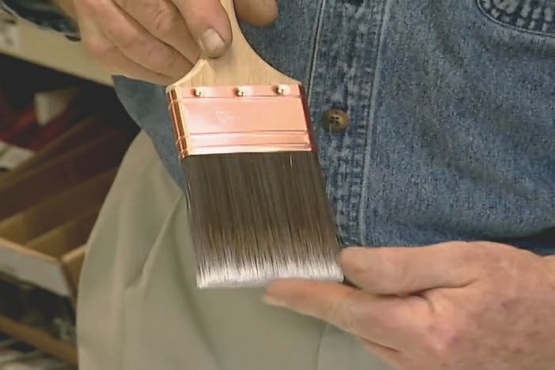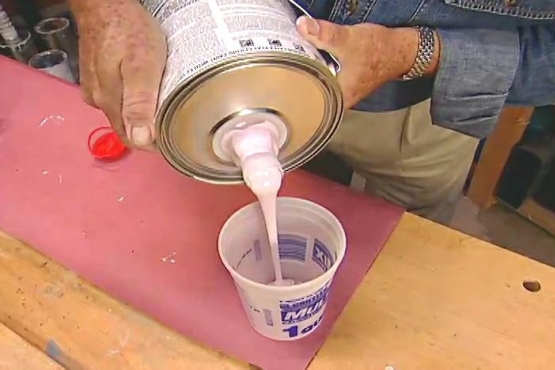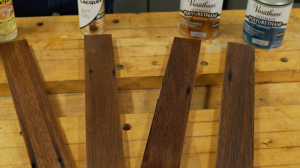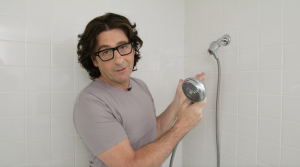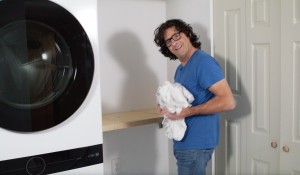How to Remove Numerous Layers of Old Paint
Remove a Century of Lead Paint Build-up from Your Front Door in a Project That Is Not Quite a Honeymoon!
Spend your honeymoon or your weekend revealing your front door's century-old style and workmanship under decades of lead paint build-up. Remove the layers with modern paste strippers that cling while they work. Throughout the project, protect yourself from exposure to the lead and chemicals with required protective gear! It's a memorable and productive way to start a marriage!
Read More
Lay the Door Flat While You Remove Paint
Lift the door off its hinges with a pry bar and a block of wood that also saves your back. Choose a work area that is well ventilated but protected from weather while you remove lead paint.

Detach Hardware before Starting to Remove Lead Paint
Remove all the hardware. It may also require your efforts to remove lead paint so it can be preserved for reinstallation. Beneath, you may see just how many different colors and coats of lead paint have been applied.

Remove Paint and Glazing from the Glass
Chip out fractured glazing compound around the glass window to lift it out. Remove lead paint from the glass and preserve the window for reinstallation--especially if waves and imperfections indicate the glass is as old as the door!

Protect Yourself while You Remove Paint
Wear respirators and disposable paper coveralls along with gloves and eye protection to ensure that you protect yourself while you remove lead paint. Such harmful elements are controlled now, but in bygone eras, they were in common use.

Apply Paste Stripper to Remove Paint
Use a clinging paste-type stripper to remove lead paint. Brush a generous amount on the surface, but don't over-brush or the active ingredients will evaporate before they have time to work.

Remove Paint Layers with a Putty Knife
Remove lead paint layers, lifting the softened and bubbled layers off with a wide putty knife. Use a brass-bristled brush to remove loose paint from the moldings. Some paint may resist the stripper.

Use a Different Stripper to Remove Paint
Change to an alkaline-based stripper to remove lead paint when the last few coats were not touched by the original paint stripper. Apply the new formula with a putty knife to flat areas and use brush on molding and details.

Keep Alkaline Paste Wet to Remove Paint
Keep the alkaline paste wet for 24 hours to remove lead paint. Cover it with freezer paper (shiny side up) pressed in contact to eliminate as much air as possible. Drape the entire project with heavy plastic sheeting.

Working a Section at a Time to Remove Paint
Work one section at a time, lifting with a putty knife to remove lead paint. Keep the alkaline stripper damp until the lead paint is removed.

Continue Applying Stripper to Remove Paint Layers
Continue applying stripper to remove lead paint layers until the bare wood is ready for stain and varnish. The alternative is to resort to sanding the remaining patches and then priming and repainting the door. (Don't give up!)
Related Tips
Blog Articles
How to Protect Unfinished Wood
Many people are unsure how to protect unfinished wood. Perhaps you've bought a used piece of furniture, sanded it down, and revealed its beautiful wood grain. Now, you want to preserve its natural beauty without painting it. What should you use? In this blog post, we’ll guide you through your options to help protect and showcase your wood piece.
Reasons You Should Replace Your Shower Head
Brian had some guests over – and when they left, he discovered that the shower head was broken. In this video, he will show you how easy it is to replace a showerhead. Whether you're upgrading from a basic plastic model to a sleek stainless steel version, or simply need to fix a broken one, the process is easy.
A Space-Saving Laundry Hack
Are you tired of cramped laundry areas and limited workspace? If you have a small space, we have a big solution for you! This DIY project is perfect to maximize your space and create a functional laundry area. Using a folding shelf bracket, you can easily create a countertop that folds up when not in use, saving valuable space. What’s the best part of a folding laundry shelf? You can customize it to fit your unique style and needs.

